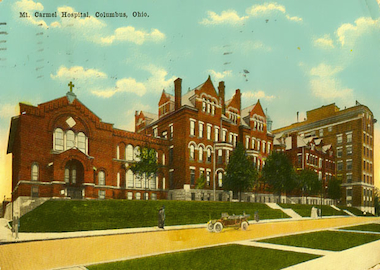The Green family who initiated the Hobby Lobby case may be evangelical Christians, but Hobby Lobby is very much a product of the Catholic Church’s long standing efforts to create conscience exemptions from the provision of reproductive health care.
The road to Hobby Lobby began in 1972, when the ACLU filed suit against St. Vincent’s Hospital, a Catholic hospital in Billings, Montana, for refusing to allow a 32-year-old woman named Gloria Jean Taylor to receive a tubal ligation because of the Catholic prohibition against sterilization. The ACLU argued that the hospital was required to provide sterilization, which Taylor needed for medical reasons, since it was the only obstetrics facility in the area and accepted funding under the federal Hill-Burton Act, which provided money for hospitals to expand and modernize in return for a promise to serve the local community.
A district court ruled in Taylor’s favor, saying the hospital’s religious-based restriction “raises serious constitutional questions.” When the ACLU won a similar suit against a Catholic hospital that hadn’t accepted federal funding but was the only medical facility in a large region, which lawyers argued made it a “quasi-public” institution, it created a statewide outcry. One bishop threatened to close the maternity departments of all the Catholic hospitals in the state rather than allow sterilizations. With one-third of all babies born in Montana delivered in Catholic hospitals, it wasn’t an idle threat. The Montana Hospital Association warned of dire consequences if Catholic hospitals closed their maternity wards.
Not only were Catholic hospitals important providers, but many were respected community institutions, still run by the same orders of pioneering nurse-nuns who had come to the Pacific Northwest to provide care to miners, railroad workers and ranchers on the ragged edge of the frontier with little respect to their religion or even their ability to pay. Even some non-Catholics voiced fears that rights of their local hospitals were being violated. “I am not a Catholic, but I think people of all faiths should see this as a threat to our religious freedom,” one woman wrote to the Billings Gazette.
And there was a potentially more explosive issue hovering in the background—abortion, which several states had already legalized. “At some point in the not too distant future, the American Civil Liberties Union, or some other individual or organization, is going to challenge a Catholic hospital when it refuses to let its facilities be used by a woman who wants an abortion,” warned an editorial in the Helena Independent Record.
“There are definite civil principles being formed,” noted Bishop Schuster. A little more than a month later, the Supreme Court legalized abortion in Roe v. Wade. What had been an outcry turned into an uproar. At a heated press conference, Spokane Bishop Bernard Topel threatened to close every Catholic hospital in his diocese and go to jail rather than allow a single one to perform an abortion.
The brouhaha caught the attention of Idaho Senator Frank Church, a leading liberal and one of the earliest opponents of the Vietnam War. But he came from a conservative Catholic family and was outraged by the idea that the Catholic hospitals of the Pacific Northwest might be forced to perform abortions. “How could anyone suggest such a thing?” he once demanded.
When a package of public health bills, including the Hill-Burton Act, came up for reauthorization in March, Church warned Congress that it needed to act “or we are going to leave this to many different courts to decide.” He proposed an amendment that would prohibit the federal government from tying any public health funding to the requirement than an individual or hospital perform an abortion or sterilization contrary to their religious beliefs. “[I]t should be evident that a provision needs to be written into the law to fortify freedom of religion as it related to the implementation of any and all Federal programs affecting medicine and medical care,” he said.
The Church Amendment went well beyond the traditional understanding of conscience exemptions, which historically had been granted to prevent an individual from being compelled to perform an act that went against his or her conscience. Fueled by pressure from the Catholic bishops and the Catholic Hospital Association and protectiveness toward valued community institutions, as well as a sense by many in Congress that it needed to reassert its authority on the issue of abortion, the amendment sailed though the Senate 92-1, with little debate over the implications of granting a “conscience” to an institution.
Only Senator Jacob Javits, who was a constitutional lawyer, questioned whether an institution can “have a religious scruple without violating the establishment clause of the constitution,” and whether it was “equal protection of the laws” to provide federal aid to an institution “which proscribes or prohibits … a perfectly lawful hospital function.”
Nonetheless, the House passed the amendment and it became law in June of 1973. A 1975 article in the William & Mary Law Review concluded that while the amendment’s protection of an individual’s right not to perform abortion or sterilization was constitutionally valid:
No court has decided clearly the issue of whether an institution possesses the same right to free exercise of religion as is clearly possessed by an individual. Indeed, it is hard to conceive of an institution or organization per se possessing any kind of beliefs or putting them into practice. … As the issue of the existence of a corporate “conscience” has never been litigated, let alone settled, the constitutional status of the protection afforded to institutions by [the Church Amendment] remains uncertain.
The Supreme Court declined to hear a challenge to the amendment the following year. Once hospitals had in effect been granted a conscience, the concept of nonprofit corporations with moral compasses was expanded over the years, often at the behest of Catholic providers, to encompass religiously affiliated HMOs and health insurers, who were exempted from various laws regarding abortion and contraception. From there, it was plausible, if not constitutional in the eyes of many, to claim that a for-profit entity like Hobby Lobby has a “conscience.”





